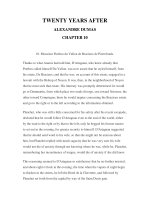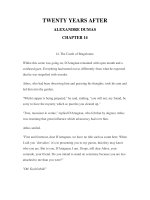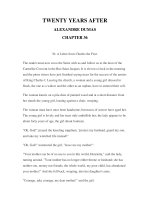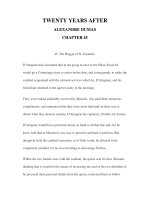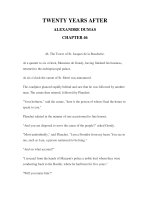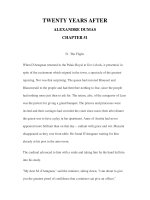LUYỆN ĐỌC TIẾNG ANH QUA CÁC TÁC PHẨM VĂN HỌC –TEN YEARS AFTER ALEXANDRE DUMAS CHAPTER 10 pps
Bạn đang xem bản rút gọn của tài liệu. Xem và tải ngay bản đầy đủ của tài liệu tại đây (44.24 KB, 15 trang )
TEN YEARS AFTER
ALEXANDRE DUMAS
CHAPTER 10
The Tents.
The admiral, as we have seen, was determined to pay no further attention
to Buckingham's threatening glances and fits of passion. In fact, from
the moment they quitted England, he had gradually accustomed himself to
his behavior. De Guiche had not yet in any way remarked the animosity
which appeared to influence that young nobleman against him, but he felt,
instinctively, that there could be no sympathy between himself and the
favorite of Charles II. The queen-mother, with greater experience and
calmer judgment, perceived the exact position of affairs, and, as she
discerned its danger, was prepared to meet it, whenever the proper moment
should arrive. Quiet had been everywhere restored, except in
Buckingham's heart; he, in his impatience, addressed himself to the
princess, in a low tone of voice: "For Heaven's sake, madame, I implore
you to hasten your disembarkation. Do you not perceive how that insolent
Duke of Norfolk is killing me with his attentions and devotions to you?"
Henrietta heard this remark; she smiled, and without turning her head
towards him, but giving only to the tone of her voice that inflection of
gentle reproach, and languid impertinence, which women and princesses so
well know how to assume, she murmured, "I have already hinted, my lord,
that you must have taken leave of your senses."
Not a single detail escaped Raoul's attention; he heard both Buckingham's
entreaty and the princess's reply; he remarked Buckingham retire, heard
his deep sigh, and saw him pass a hand over his face. He understood
everything, and trembled as he reflected on the position of affairs, and
the state of the minds of those about him. At last the admiral, with
studied delay, gave the last orders for the departure of the boats.
Buckingham heard the directions given with such an exhibition of delight
that a stranger would really imagine the young man's reason was
affected. As the Duke of Norfolk gave his commands, a large boat or
barge, decked with flags, and capable of holding about twenty rowers and
fifteen passengers, was slowly lowered from the side of the admiral's
vessel. The barge was carpeted with velvet and decorated with coverings
embroidered with the arms of England, and with garlands of flowers; for,
at that time, ornamentation was by no means forgotten in these political
pageants. No sooner was this really royal boat afloat, and the rowers
with oars uplifted, awaiting, like soldiers presenting arms, the
embarkation of the princess, than Buckingham ran forward to the ladder in
order to take his place. His progress was, however, arrested by the
queen. "My lord," she said, "it is hardly becoming that you should allow
my daughter and myself to land without having previously ascertained that
our apartments are properly prepared. I beg your lordship to be good
enough to precede us ashore, and to give directions that everything be in
proper order on our arrival."
This was a fresh disappointment for the duke, and, still more so, since
it was so unexpected. He hesitated, colored violently, but could not
reply. He had thought he might be able to keep near Madame during the
passage to the shore, and, by this means, to enjoy to the very last
moment the brief period fortune still reserved for him. The order,
however, was explicit; and the admiral, who heard it given, immediately
called out, "Launch the ship's gig." His directions were executed with
that celerity which distinguishes every maneuver on board a man-of-war.
Buckingham, in utter hopelessness, cast a look of despair at the
princess, of supplication towards the queen, and directed a glance full
of anger towards the admiral. The princess pretended not to notice him,
while the queen turned aside her head, and the admiral laughed outright,
at the sound of which Buckingham seemed ready to spring upon him. The
queen-mother rose, and with a tone of authority said, "Pray set off, sir."
The young duke hesitated, looked around him, and with a last effort, half-
choked by contending emotions, said, "And you, gentlemen, M. de Guiche
and M. de Bragelonne, do not you accompany me?"
De Guiche bowed and said, "Both M. de Bragelonne and myself await her
majesty's orders; whatever the commands she imposes on us, we shall obey
them." Saying this, he looked towards the princess, who cast down her
eyes.
"Your grace will remember," said the queen, "that M. de Guiche is here to
represent Monsieur; it is he who will do the honors of France, as you
have done those of England; his presence cannot be dispensed with;
besides, we owe him this slight favor for the courage he displayed in
venturing to seek us in such a terrible stress of weather."
Buckingham opened his lips, as if he were about to speak, but, whether
thoughts or expressions failed him, not a syllable escaped them, and
turning away, as though out of his mind, he leapt from the vessel into
the boat. The sailors were just in time to catch hold of him to steady
themselves; for his weight and the rebound had almost upset the boat.
"His grace cannot be in his senses," said the admiral aloud to Raoul.
"I am uneasy on the Duke's account," replied Bragelonne.
While the boat was advancing towards the shore, the duke kept his eyes
immovably fixed on the admiral's ship, like a miser torn away from his
coffers, or a mother separated from her child, about to be lead away to
death. No one, however, acknowledged his signals, his frowns, or his
pitiful gestures. In very anguish of mind, he sank down in the boat,
burying his hands in his hair, whilst the boat, impelled by the exertions
of the merry sailors, flew over the waves. On his arrival he was in such
a state of apathy, that, had he not been received at the harbor by the
messenger whom he had directed to precede him, he would hardly have had
strength to ask his way. Having once, however, reached the house which
had been set apart for him, he shut himself up, like Achilles in his
tent. The barge bearing the princess quitted the admiral's vessel at the
very moment Buckingham landed. It was followed by another boat filled
with officers, courtiers, and zealous friends. Great numbers of the
inhabitants of Le Havre, having embarked in fishing-cobles and boats of
every description, set off to meet the royal barge. The cannon from the
forts fired salutes, which were returned by the flagship and the two
other vessels, and the flashes from the open mouths of the cannon floated
in white fumes over the waves, and disappeared in the clear blue sky.
The princess landed at the decorated quay. Bands of gay music greeted
her arrival, and accompanied her every step she took. During the time
she was passing through the center of town, and treading beneath her
delicate feet the richest carpets and the gayest flowers, which had been
strewn upon the ground, De Guiche and Raoul, escaping from their English
friends, hurried through the town and hastened rapidly towards the place
intended for the residence of Madame.
"Let us hurry forward," said Raoul to De Guiche, "for if I read
Buckingham's character aright, he will create some disturbance, when he
learns the result of our deliberations of yesterday."
"Never fear," said De Guiche, "De Wardes is there, who is determination
itself, while Manicamp is the very personification of the artless
gentleness."
De Guiche was not, however, the less diligent on that account, and five
minutes afterwards they were within sight of the Hotel de Ville. The
first thing which struck them was the number of people assembled in the
square. "Excellent," said De Guiche; "our apartments, I see, are
prepared."
In fact, in front of the Hotel de Ville, upon the wide open space before
it, eight tents had been raised, surmounted by the flags of France and
England united. The hotel was surrounded by tents, as by a girdle of
variegated colors; ten pages and a dozen mounted troopers, for an escort,
mounted guard before the tents. It had a singularly curious effect,
almost fairy-like in its appearance. These tents had been constructed
during the night-time. Fitted up, within and without, with the richest
materials that De Guiche had been able to procure in Le Havre, they
completely encircled the Hotel de Ville. The only passage which led to
the steps of the hotel, and which was not inclosed by the silken
barricade, was guarded by two tents, resembling two pavilions, the
doorways of both of which opened towards the entrance. These two tents
were destined for De Guiche and Raoul; in whose absence they were
intended to be occupied, that of De Guiche by De Wardes, and that of
Raoul by Manicamp. Surrounding these two tents, and the six others, a
hundred officers, gentlemen, and pages, dazzling in their display of silk
and gold, thronged like bees buzzing about a hive. Every one of them,
their swords by their sides, was ready to obey the slightest sign either
of De Guiche or Bragelonne, the leaders of the embassy.
At the very moment the two young men appeared at the end of one of the
streets leading to the square, they perceived, crossing the square at
full gallop, a young man on horseback, whose costume was of surprising
richness. He pushed hastily thorough the crowd of curious lookers-on,
and, at the sight of these unexpected erections, uttered a cry of anger
and dismay. It was Buckingham, who had awakened from his stupor, in
order to adorn himself with a costume perfectly dazzling from its beauty,
and to await the arrival of the princess and the queen-mother at the
Hotel de Ville. At the entrance to the tents, the soldiers barred his
passage, and his further progress was arrested. Buckingham, hopelessly
infuriated, raised his whip; but his arm was seized by a couple of
officers. Of the two guardians of the tent, only one was there. De
Wardes was in the interior of the Hotel de Ville, engaging in attending
to the execution of some orders by De Guiche. At the noise made by
Buckingham, Manicamp, who was indolently reclining upon the cushions at
the doorway of one of the tents, rose with his usual indifference, and,
perceiving that the disturbance continued, made his appearance from
underneath the curtains. "What is the matter?" he said, in a gentle tone
of voice, "and who is making this disturbance?"
It so happened, that, at the moment he began to speak, silence had just
been restored, and, although his voice was very soft and gentle in its
touch, every one heard his question. Buckingham turned round, and looked
at the tall thin figure, and the listless expression of countenance of
his questioner. Probably the personal appearance of Manicamp, who was
dressed very plainly, did not inspire him with much respect, for he
replied disdainfully, "Who may you be, monsieur?"
Manicamp, leaning on the arm of a gigantic trooper, as firm as the pillar
of a cathedral, replied in his usual tranquil tone of voice, - "And
_you_, monsieur?"
"I, monsieur, am the Duke of Buckingham; I have hired all the houses
which surround the Hotel de Ville, where I have business to transact; and
as these houses are let, they belong to me, and, as I hired them in order
to preserve the right of free access to the Hotel de Ville, you are not
justified in preventing me passing to it."
"But who prevents you passing, monsieur?" inquired Manicamp.
"Your sentinels."
"Because you wish to pass on horseback, and orders have been given to let
only persons on foot pass."
"No one has any right to give orders here, except myself," said
Buckingham.
"On what grounds?" inquired Manicamp, with his soft tone. "Will you do
me the favor to explain this enigma to me?"
"Because, as I have already told you, I have hired all the houses looking
on the square."
"We are very well aware of that, since nothing but the square itself has
been left for us."
"You are mistaken, monsieur; the square belongs to me, as well as the
houses in it."
"Forgive me, monsieur, but you are mistaken there. In _our_ country, we
say, the highway belongs to the king, therefore this square is his majesty's;
and, consequently, as we are the king's ambassadors, the square belongs
to us."
"I have already asked you who you are, monsieur," exclaimed Buckingham,
exasperated at the coolness of his interlocutor.
"My name is Manicamp," replied the young man, in a voice whose tones were
as harmonious and sweet as the notes of an Aeolian harp.
Buckingham shrugged his shoulders contemptuously, and said, "When I hired
these houses which surround the Hotel de Ville, the square was
unoccupied; these barracks obstruct my sight; I hereby order them to be
removed."
A hoarse and angry murmur ran through the crowd of listeners at these
words. De Guiche arrived at this moment; he pushed through the crowd
which separated him from Buckingham, and, followed by Raoul, arrived on
the scene of action from one side, just as De Wardes came up from the
other. "Pardon me, my lord; but if you have any complaint to make, have
the goodness to address it to me, inasmuch as it was I who supplied the
plans for the construction of these tents."
"Moreover, I would beg you to observe, monsieur, that the term 'barrack'
is a highly objectionable one!" added Manicamp, graciously.
"You were saying, monsieur - " continued De Guiche.
"I was saying, monsieur le comte," resumed Buckingham, in a tone of anger
more marked than ever, although in some measure moderated by the presence
of an equal, "I was saying that it is impossible these tents can remain
where they are."
"_Impossible!_" exclaimed De Guiche, "and why?"
"Because I object to them."
A movement of impatience escaped De Guiche, but a warning glance from
Raoul restrained him.
"You should the less object to them, monsieur, on account of the abuse of
priority you have permitted yourself to exercise."
"_Abuse!_"
"Most assuredly. You commission a messenger, who hires in your name the
whole of the town of Le Havre, without considering the members of the
French court, who would be sure to arrive here to meet Madame. Your
Grace will admit that this is hardly friendly conduct in the
representative of a friendly nation."
"The right of possession belongs to him who is first on the ground."
"Not in France, monsieur."
"Why not in France?"
"Because France is a country where politeness is observed."
"Which means?" exclaimed Buckingham, in so violent a manner that those
who were present drew back, expecting an immediate collision.
"Which means, monsieur," replied De Guiche, now rather pale, "that I
caused these tents to be raised as habitations for myself and my friends,
as a shelter for the ambassadors of France, as the only place of refuge
which your exactions have left us in the town; and that I and those who
are with me, shall remain in them, at least, until an authority more
powerful, and more supreme, than your own shall dismiss me from them."
"In other words, until we are ejected, as the lawyers say," observed
Manicamp, blandly.
"I know an authority, monsieur, which I trust is such as you will
respect," said Buckingham, placing his hand on his sword.
At this moment, and as the goddess of Discord, inflaming all minds, was
about to direct their swords against each other, Raoul gently placed his
hand on Buckingham's shoulder. "One word, my lord," he said.
"My right, my right, first of all," exclaimed the fiery young man.
"It is precisely upon that point I wish to have the honor of addressing a
word to you."
"Very well, monsieur, but let your remarks be brief."
"One question is all I ask; you can hardly expect me to be briefer."
"Speak, monsieur, I am listening."
"Are you, or is the Duke of Orleans, going to marry the granddaughter of
Henry IV.?"
"What do you mean?" exclaimed Buckingham, retreating a few steps,
bewildered.
"Have the goodness to answer me," persisted Raoul tranquilly.
"Do you mean to ridicule me, monsieur?" inquired Buckingham.
"Your question is a sufficient answer for me. You admit, then, that it
is not you who are going to marry the princess?"
"You know it perfectly well, monsieur, I should imagine."
"I beg your pardon, but your conduct has been such as to leave it not
altogether certain."
"Proceed, monsieur, what do you mean to convey?"
Raoul approached the duke. "Are you aware, my lord," he said, lowering
his voice, "that your extravagances very much resemble the excesses of
jealousy? These jealous fits, with respect to any woman, are not
becoming in one who is neither her lover nor her husband; and I am sure
you will admit that my remark applies with still greater force, when the
lady in question is a princess of the blood royal!"
"Monsieur," exclaimed Buckingham, "do you mean to insult Madame
Henrietta?"
"Be careful, my lord," replied Bragelonne, coldly, "for it is you who
insult her. A little while since, when on board the admiral's ship, you
wearied the queen, and exhausted the admiral's patience. I was
observing, my lord; and, at first, I concluded you were not in possession
of your senses, but I have since surmised the real significance of your
madness."
"Monsieur!" exclaimed Buckingham.
"One moment more, for I have yet another word to add. I trust I am the
only one of my companions who has guessed it."
"Are you aware, monsieur," said Buckingham, trembling with mingled
feelings of anger and uneasiness, "are you aware that you are holding
language towards me which requires to be checked?"
"Weigh your words well, my lord," said Raoul, haughtily; "my nature is
not such that its vivacities need checking; whilst you, on the contrary,
are descended from a race whose passions are suspected by all true
Frenchmen; I repeat, therefore, for the second time, be careful!"
"Careful of what, may I ask? Do you presume to threaten me?"
"I am the son of the Comte de la Fere, my lord, and I never threaten,
because I strike first. Therefore, understand me well, the threat that I
hold out to you is this - "
Buckingham clenched his hands, but Raoul continued, as though he had not
observed the gesture. "At the very first word, beyond the respect and
deference due to her royal highness, which you permit yourself to use
towards her, - be patient my lord, for I am perfectly so."
"You?"
"Undoubtedly. So long as Madame remained on English territory, I held my
peace; but from the very moment she stepped on French ground, and now
that we have received her in the name of the prince, I warn you, that at
the first mark of disrespect which you, in your insane attachment,
exhibit towards the royal house of France, I shall have one of two
courses to follow; - either I declare, in the presence of every one, the
madness with which you are now affected, and I get you ignominiously
ordered back to England; or if you prefer it, I will run my dagger
through your throat in the presence of all here. This second alternative
seems to me the least disagreeable, and I think I shall hold to it."
Buckingham had become paler than the lace collar around his neck. "M. de
Bragelonne," he said, "is it, indeed, a gentleman who is speaking to me?"
"Yes; only the gentleman is speaking to a madman. Get cured, my lord,
and he will hold quite another language to you."
"But, M. de Bragelonne," murmured the duke, in a voice, half-choked, and
putting his hand to his neck, - "Do you not see I am choking?"
"If your death were to take place at this moment, my lord," replied
Raoul, with unruffled composure, "I should, indeed, regard it as a great
happiness, for this circumstance would prevent all kinds of evil remarks;
not alone about yourself, but also about those illustrious persons whom
your devotion is compromising in so absurd a manner."
"You are right, you are right," said the young man, almost beside
himself. "Yes, yes; better to die, than to suffer as I do at this
moment." And he grasped a beautiful dagger, the handle of which was
inlaid with precious stones; and which he half drew from his breast.
Raoul thrust his hand aside. "Be careful what you do," he said; "if you
do not kill yourself, you commit a ridiculous action; and if you were to
kill yourself, you sprinkle blood upon the nuptial robe of the princess
of England."
Buckingham remained a minute gasping for breath; during this interval,
his lips quivered, his fingers worked convulsively, and his eyes
wandered, as though in delirium. Then suddenly, he said, "M. de
Bragelonne, I know nowhere a nobler mind than yours; you are, indeed, a
worthy son of the most perfect gentleman that ever lived. Keep your
tents." And he threw his arms round Raoul's neck. All who were present,
astounded at this conduct, which was the very reverse of what was
expected, considering the violence of the one adversary and the
determination of the other, began immediately to clap their hands, and a
thousand cheers and joyful shouts arose from all sides. De Guiche, in
his turn, embraced Buckingham somewhat against his inclination; but, at
all events, he did embrace him. This was the signal for French and
English to do the same; and they who, until that moment, had looked at
each other with restless uncertainty, fraternized on the spot. In the
meantime, the procession of the princess arrived, and had it not been for
Bragelonne, two armies would have been engaged together in conflict, and
blood would have been shed upon the flowers with which the ground was
covered. At the appearance, however, of the banners borne at the head of
the procession, complete order was restored.
